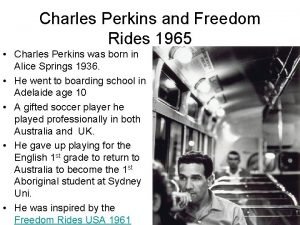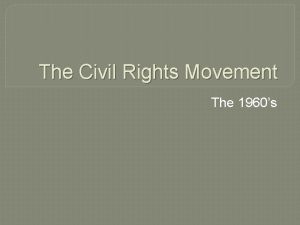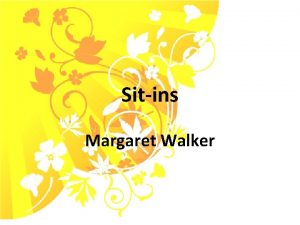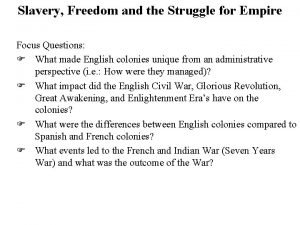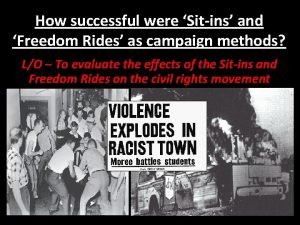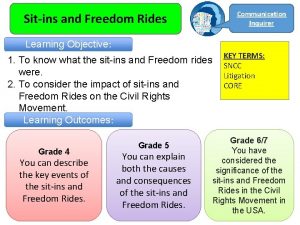Student SitIns and Freedom Rides A Struggle for






- Slides: 6

Student Sit-Ins and Freedom Rides A Struggle for Equality

The Greensboro Sit-In The Southern USA during the 50 s and 60 s was inherently racist. The state governments put in force a practice called segregation, where blacks and whites were kept totally separate from each other. Facilities for black people were usually vastly inferior. On the 1 st of February 1960, four black university students in Greensboro, North Carolina, Jibreel Khazan (Ezell Blair Jr. ), Franklin Eugene Mc. Cain, Joseph Alfred Mc. Neil and David Lenail Richmond, made a daring protest against the segregation laws of America’s deep south. They walked into the local Woolworths, a segregated establishment, and sat at the counter in the lunch bar, a ‘whites only’ area (blacks were expected to stand eat). The students were sick of being discriminated against and not being allowed the same privileges as the white people. This was an important event in the history of black civil rights because it was the start of a nation-wide movement against segregation.

Freedom Rides In 1961, the Freedom Riders, a dedicated group of men and women, black and white, young and old across the country boarded buses, trains and planes bound South to challenge that region‘s outdated Jim Crow laws and the noncompliance with a US Supreme Court decision that prohibited segregation in all interstate public transportation facilities. The first Freedom Riders were members of the Nashville Student Group, a local group of students who had successfully desegregated the lunch counters and movie theatres in that city. Freedom Rides boarded the buses and took their places, blacks and whites seated together on the bus, an act already considered a crime in most segregated states. At stops along the way, the Freedom Riders entered “whites” and “coloured” areas contrary to where they were supposed to go and ate together at segregated lunch counters. They met little resistance along the way until Rockville, S. C. where an angry mob beat the Freedom Riders as they pulled into the station. This was the first of many such beatings the Freedom Riders were to receive at the hands of angry mobs.

Freedom Rides cont. Undaunted by the beatings. the Freedom Riders continued on their journey until May, 14 th, 1961 when they were met by an angry mob in Anniston, Alabama. a firebomb was thrown and exploded inside the bus. As the Freedom Riders tried to escape the exit doors were blocked by the mob. One of the gas tanks exploded and the mob rushed back allowing the Freedom Riders to push the doors open and escape. As they exited the burning bus, they rushed outside and were beaten by the waiting vigilantes with lead pipes and baseball bats. Only an onboard undercover agent prevented the Freedom Riders from being lynched. Later that same day the Freedom Riders were beaten a second time as they arrived in Birmingham, Alabama.

The Relationship Between Student Sit ins, Freedom Rides, and Maya Angelou’s Poetry In both events the black students suffered abuse but still continued to protest because they believed in their cause. This relates to Maya Angelou’s poem ‘still I rise’. ‘You may shoot me with your words, You may cut me with your eyes, You may kill me with your hatefulness, But still, like air, I’ll rise. ’ This stanza from ‘still I rise’ reflects how the blacks felt went they were protesting against segregation in the south. They were being discriminated against and although they were constantly put down, they continued to protest ‘rise’ with sit ins and freedom rides to prove their point that this segregation was wrong.

Continued… Student sit ins and freedom rides also relate to Maya Angelou’s poem ‘Equality’. This poem has strong allusions to the protests of blacks against segregation. ‘Yes my drums are beating nightly, And my rhythms never change. Equality and I will be free. ’ The mention of drums beating out a message of equality relates to drums used in protests and military marches to give power to their speeches and rhythm to their marching. The repetition of the line “equality and I will be free” sounds like a protest chant, another allusion to protest marches.
